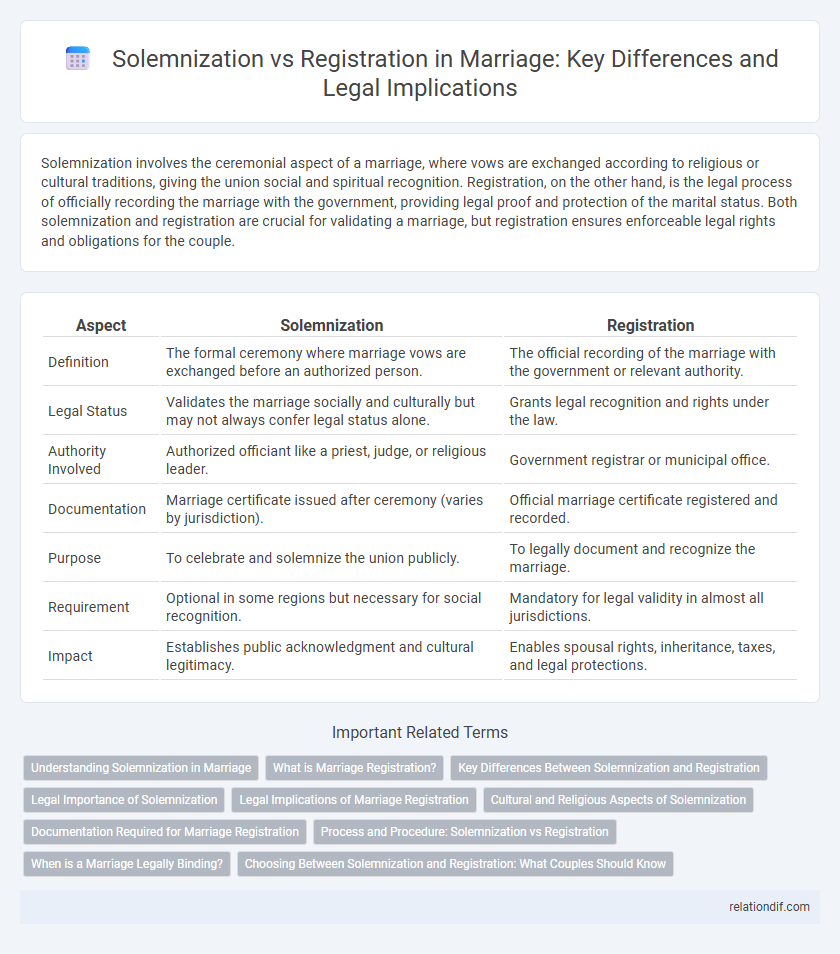Solemnization involves the ceremonial aspect of a marriage, where vows are exchanged according to religious or cultural traditions, giving the union social and spiritual recognition. Registration, on the other hand, is the legal process of officially recording the marriage with the government, providing legal proof and protection of the marital status. Both solemnization and registration are crucial for validating a marriage, but registration ensures enforceable legal rights and obligations for the couple.
Table of Comparison
| Aspect | Solemnization | Registration |
|---|---|---|
| Definition | The formal ceremony where marriage vows are exchanged before an authorized person. | The official recording of the marriage with the government or relevant authority. |
| Legal Status | Validates the marriage socially and culturally but may not always confer legal status alone. | Grants legal recognition and rights under the law. |
| Authority Involved | Authorized officiant like a priest, judge, or religious leader. | Government registrar or municipal office. |
| Documentation | Marriage certificate issued after ceremony (varies by jurisdiction). | Official marriage certificate registered and recorded. |
| Purpose | To celebrate and solemnize the union publicly. | To legally document and recognize the marriage. |
| Requirement | Optional in some regions but necessary for social recognition. | Mandatory for legal validity in almost all jurisdictions. |
| Impact | Establishes public acknowledgment and cultural legitimacy. | Enables spousal rights, inheritance, taxes, and legal protections. |
Understanding Solemnization in Marriage
Solemnization in marriage refers to the formal ceremony where the couple exchanges vows before an authorized officiant and witnesses, fulfilling the legal and cultural requirements for a valid union. This process often involves religious, traditional, or civil rites specific to the jurisdiction or community, emphasizing the public acknowledgment of the marriage. Unlike registration, which is the administrative recording of the marriage with civil authorities, solemnization is the ceremonial act establishing the marriage bond in the presence of others.
What is Marriage Registration?
Marriage registration is the legal process of officially recording a marriage with government authorities, ensuring the union is recognized under the law. This documentation provides couples with legal rights and protections related to property, inheritance, and spousal benefits. Unlike solemnization, which is the ceremonial act of marriage, registration formalizes the marriage in public records and grants it legal validity.
Key Differences Between Solemnization and Registration
Solemnization refers to the formal act of performing a marriage ceremony recognized by law, often involving rituals and witnesses, while registration is the administrative process of officially recording the marriage in government records. Solemnization establishes the legal validity of the marriage, whereas registration provides legal proof and documentation for future legal and administrative purposes. Key differences include the timing, with solemnization occurring during the marriage event and registration happening post-ceremony, and the fact that solemnization involves personal and cultural elements, while registration is purely administrative.
Legal Importance of Solemnization
Solemnization of marriage is a crucial legal act that officially recognizes the union under the law, often involving a licensed officer or religious authority to validate the ceremony. Unlike mere registration, solemnization provides immediate legal acknowledgment and can be essential for the marriage's legitimacy, impacting rights related to property, inheritance, and spousal benefits. Courts frequently prioritize solemnized marriages in disputes, underscoring its significance over mere administrative registration.
Legal Implications of Marriage Registration
Marriage registration provides a legally recognized proof of the marital union, essential for enforcing spousal rights and obligations under family law. Solemnization, while symbolically significant, does not automatically confer legal status without formal registration in government records. Registered marriages ensure eligibility for benefits such as inheritance, tax relief, and social security, thereby preventing disputes over marital validity in legal proceedings.
Cultural and Religious Aspects of Solemnization
Solemnization of marriage deeply reflects cultural and religious traditions, often involving rituals and customs specific to communities, such as Hindu vivaah sastras or Christian nuptial blessings, which symbolize spiritual union and societal acceptance. Unlike registration, which is a legal formality codifying the union for state recognition, solemnization emphasizes the sanctity and cultural significance of marriage through ceremonies passed down generations. These rites reinforce identity, communal bonds, and moral commitments beyond the legal framework of marriage registration.
Documentation Required for Marriage Registration
Marriage registration requires essential documents such as proof of age, identity proofs of both parties, and address verification. Additionally, affidavits confirming marital status and photographs may be mandated by local authorities. Ensuring all paperwork, including the marriage invitation card when applicable, is accurate expedites the registration process under prevailing marriage laws.
Process and Procedure: Solemnization vs Registration
Solemnization involves conducting a formal marriage ceremony according to religious or cultural traditions, often requiring the presence of authorized officiants, witnesses, and rituals specific to the community. Registration refers to the legal process of documenting the marriage with government authorities, ensuring official recognition by submitting necessary documents such as marriage certificates, identity proofs, and completed application forms. The key difference lies in solemnization being the ceremonial validation of marriage, while registration provides the legal status and protection under marriage laws.
When is a Marriage Legally Binding?
A marriage becomes legally binding when it is either solemnized according to the laws of the jurisdiction or officially registered with the appropriate civil authority. Solemnization involves conducting a ceremony performed by an authorized officiant, fulfilling legal requirements such as consent and witness presence. Registration formalizes the marriage by recording it in a government registry, providing official proof of the union and legal recognition.
Choosing Between Solemnization and Registration: What Couples Should Know
Choosing between marriage solemnization and registration hinges on legal recognition and cultural preferences. Solemnization involves a formal ceremony following religious or traditional rites, often supplemented by legal marriage registration to ensure state acknowledgment. Couples should verify local marriage laws to understand the binding effects and documentation requirements associated with each option, ensuring their union is legally valid and socially recognized.
Solemnization vs Registration Infographic

 relationdif.com
relationdif.com